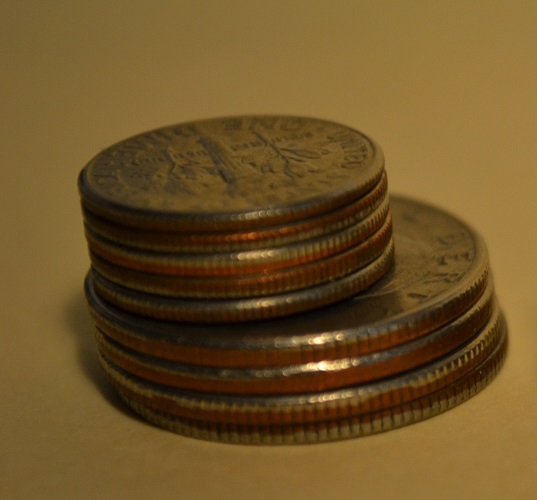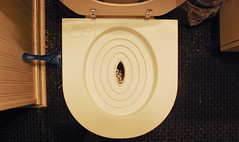
I don’t gamble much. I’ve got this boring kind of luck that let’s me gamble for a really long time on not much money, without ever winning big.
For example, when my wife was very pregnant with our first monster, we took a trip to visit my parents. It’s a 2 hour drive, and she needed a break halfway there. In the truck stop, we bought $5 worth of scratch-offs to pass some time. We turned in the winning tickets for more scratch-offs. And again. And again. Two hours later, we were out of winners, but had never accumulated more than $10.
Another time, we went to the casino to play slots. It took nearly 8 hours to spend $20. That sounds boring, but we had good conversation while we were playing.
I’ve never had a big win or a big loss from gambling, so I’ve always been kind of bored with the idea.
Now, cheating at blackjack, that’s a different matter. Pulling one over on the casino without getting caught…they make movies about that kind of stuff.
To be clear: counting cards in your head isn’t cheating. Legally, the worst that can happen is you can be asked to leave. To get a Hollywood-I-cheated-the-casino-and-got-caught-and-beat-by-the-mob kind of beating, you need to win a lot.
A lot.
To get started, there are a few things you need to know. One of those things is how to play blackjack, but I’m not going to get into the basics. If you don’t know how to hit, stand, or count to 21 without taking your clothes off, this guide may be too advanced for you. Come back later.
Super Basic Strategy
You don’t need to count cards to use this strategy. You will do better than most players if you follow along.
1. The dealer must hit, or take another card, if he has 16 points. If he has 17, he stands.
2. The hole card–the card you can’t see–is always worth 10. Of course, it’s not, but for the purposes of your strategy, assume it is.
That means, when the dealer is showing a 2, you’ll assume he’s got 12 points and will hit. If he’s showing a 7, you’ll assume he’s going to stand. If he’s showing an 8, your goal is to beat 18, not push for 21.
That’s it. If you do that, you’ll come within a couple of points of even odds against the house. Google “blackjack basic strategy” if you want to improve this.
Even odds isn’t good enough.
Card Counting
Counting cards sounds tough. Rain Man tough.
It’s not, but you’ll want to practice at home a bit before you try it in the really real world.
The rules are simple:
1. Cards 2-6 are worth 1 point.
2. The 10, jack, queen, king, and ace are worth -1.
3. For every card that is played, keep track of that score. This is a running score across multiple hands until the deck is replaced or shuffled, so don’t stop at a new deal.
4. Divide the running score by the number of decks remaining in the shoe. If there are approximated 150 cards in the dealer-thingy, that’s 3 decks, so divide by 3. If your running score is 18, that means the number your playing against is 6. If the casino is using a continuous-shuffling thingy, forget counting the cards.
That’s it. You’re never adding or subtracting more than a one, and you’re doing that against a number that tends to stay pretty low.
How do you use that, you ask? Easy.
When the score is up, bet higher. If it’s low or negative, bet lower. The higher the number, the higher your bets. If you’ve got a 5, a 6, or more, bet as much as you are comfortable with. If your playing score is low or negative, bet close to the table minimum.
Why does this work?
A higher score indicates that the main assumption of the super basic strategy is more likely to be true. When you’ve got a score of 10, you know a lot of lower-value cards have already hit the table, so it’s safer to assume that the dealer’s card is worth 10.
You don’t change anything about the way you play each hand, you just change the way you bet each hand. Counting cards doesn’t tell you specifically what’s going to happen during each hand, it just tackles the statistics of the game. It moves the odds in your favor, by up to 2 or 3 percent. Over one hand, this won’t help, so don’t sweat losing a hand here and there. Over an entire shoe of hands, you should be able to steadily win more than you lose.
And, as Brian Brushwood says, in the course of your life, very few things make a cooler story than getting kicked out of a casino for counting cards.
Do you play in casinos? Ever tried to cheat?





 ? No.
? No.

 When it comes to financial investments, it’s always better to go with an informed decision than one that relies merely on chance – besides, gambling only works when luck’s on your side. Fortunately, international investments are a financially secure and reliable form of investing as long as you know your limitations. So, in keeping with the idea of sound financial decisions, here are seven benefits of investing internationally:
When it comes to financial investments, it’s always better to go with an informed decision than one that relies merely on chance – besides, gambling only works when luck’s on your side. Fortunately, international investments are a financially secure and reliable form of investing as long as you know your limitations. So, in keeping with the idea of sound financial decisions, here are seven benefits of investing internationally: